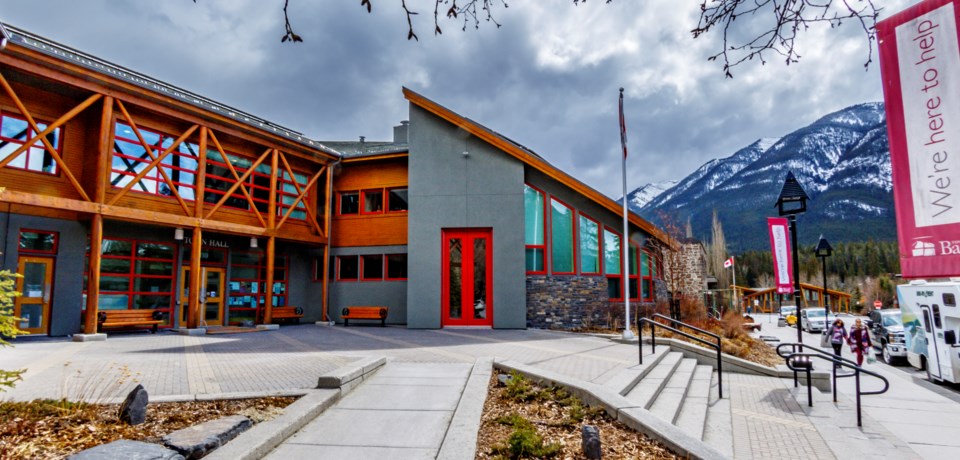BANFF – The Town of Banff’s elected officials have begun wading through what has been described as the most challenging operating budget in the municipality’s 31-year history.
The draft 2022-24 operating budget presented to council on Monday (Nov. 29) proposes to collect roughly $20 million in taxes from Banff residents and businesses next year, but that number could go up or down based on council decisions throughout the budgeting process.
Two of the biggest challenges result from a major swing in property assessments, particularly for hotels due to the COVID-19 pandemic, as well as the tax split cap conundrum that ties up the municipality’s ability to equalize the tax burden between commercial and residential sectors.
Officials say this means the municipal portion of a residential tax bill could go up by double digits, perhaps as high as 23 per cent, depending on various decisions.
“We want to make sure we were being as transparent as we could in terms of the impact of this operating budget,” said Chris Hughes, the director of corporate service for the Town of Banff.
“This will likely be the most challenging operating budget the municipality will have faced since incorporation.”
The proposed 2022-24 operating budget includes a 1.6 per cent wage increase for Town of Banff employees based on Alberta CPI. However, the budget does assume a wage/benefit savings target of $250,000 each year.
As part of the 2022 service review and budget process, administration also brought forward several new service level requests for council’s deliberation, including a $64,500 proposal to make a current two-year contract for a municipal energy coordinator a permanent position when the contract expires in May 2022.
There are a total of 23 new service requests for 2022 worth a total value of about $4.3 million – $1.58 million funded though visitor paid parking, $1.9 million from general capital reserves, $571,450 from the environmental reserve, $40,000 from the economic recovery reserve and $152,00 from taxes.
Council has already given a tentative nod of approval to spend revenue from visitor paid parking rather than taxpayer dollars on several transit-related requests, including free transit for residents on local Roam routes and an increase in bus frequency in winter on routes 1 and 2.
There’s also a request to withdraw $400,000 from the environmental reserve to fund an expansion of the rooftop solar array on the Fenlands recreation centre, expected to pay for itself through operating costs savings over a 27-year period.
As well, administration is also recommending consideration of a roughly $20,000 rebate program for electric bikes to support anywhere between 20 and 40 e-bike purchases. The suggested funding source is the environmental reserve or paid parking profits.
Other new proposals with associated operating costs include traffic lights at the busy intersection of Buffalo and Bear streets; a roadside pedestrian pathway along Bow Falls Road and a small public washroom near the canoe docks.
There is also a call for a special event to mark National Indigenous Peoples Day as well as continuation of ongoing work an Indigenous commemorative framework to recognize the community’s shared history with First Nations.
With $192,800 representing about a one percent tax increase, Councillor Hugh Pettigrew warned against spending tax dollars or money sitting in reserves at this stage as the town tries to recover from the economic fallout of COVID-19.
He was more keen on trying to get several million dollars worth of budget cuts to get the overall residential tax bill below five per cent – potentially even zero.
“These are still very tough times,” he said. “I think we’re not out of this mess for a couple of years yet.”
Aside from the tax split conundrum and the dramatic shift in assessed values, Hughes said another major challenge in putting together the 2022-24 budget comes as a result of major cuts in the 2020 operating budget due to the pandemic.
“They were meant to be temporary cuts and they were intended at the time to give some financial relief to residents and businesses in the community,” he said.
“They are not sustainable in the long-term, so at some point they need to flow back in.”
To help council and administration through this year’s challenging budget process, the Town of Banff’s assessor has provided preliminary information on residential and non-residential property assessments.
While these won’t be finalized until well into next year, Hughes said the assessor is anticipating about a five per cent jump to residential assessments, a 10 to 20 per cent reduction in hotel assessments, a two per cent increase in downtown mixed-use, such as retail.
“Because of this broad mix and change in assessed values, the amount of taxes that historically were picked up by the hotels is going to be shifted both to the residential sector and to the various other members of the non-residential sector,” he said.
Hotels make up approximately 60 per cent of Banff’s total non-residential assessed value. Roughly 47 per cent of the municipality’s entire assessment, including residential and non-residential, is hotels.
“That helps to paint the picture of what it means for their assessments to drop 20 per cent,” said Mayor Corrie DiManno.
Administration also built the draft budget based on previously-approved council decision to reduce the transfer of operating dollars to capital reserves to the tune of $1.2 million in 2022 and $475,000 in 2023 to help ease tax pressure.
The draft budget includes transfers of $266,500 from the economic recovery reserve, which is based on provincial grants that came to the municipality to help with COVID-19 -related expenses.
Remaining funds from a 2019 operating surplus of almost $1.3 million continue to be used.
“For anyone who could possibly be hopeful we could have a surplus as large again as we did in 2019, that was really unusual,” said Councillor Chip Olver.
“It came at a fortunate time for us, but is not something we can count on happening in the future.”




